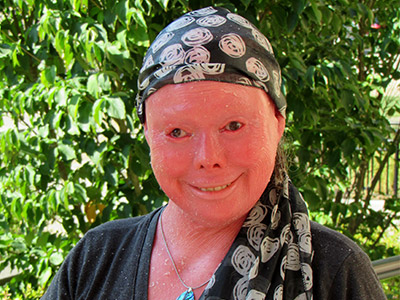A few years ago, we wrote about Hunter Steinitz, who enrolled in the PTS M.Div. program as the oldest known female living in the U.S. with Harlequin ichthyosis, a rare genetic disorder that causes an overproduction of skin cells and which few newborns survive past infancy. Hunter’s skin has always been a part of who she is, and it has also been an important aspect of her developing sense of calling. Now that Hunter is nearing the finish line of her seminary studies, we wanted to check back in on this calling, her time here, and where God might be leading her next.
“Even in high school, I sensed that seminary would be part of my future—eventually,” Hunter recalls. “My pastor had helped cultivate my spiritual gifts and suggested I consider ministry. Then I participated in PTS’s Miller Summer Youth Institute and it revealed a deep thirst for learning and ministry.” At college, Hunter’s advisor was none other than PTS Board of Directors member the Rev. Dr. Kang-Yup Na. His pastoral presence—he didn’t lead with questions about graduation or classes, but with “How are you? How’s your soul?”—added to Hunter’s desire to become a pastor herself.
By the time Hunter entered the program at Pittsburgh Seminary, her sense of calling had taken shape: she would help build a bridge, through disability work and advocacy, between those who are different and those who experience the world more comfortably. Her years at PTS have served to affirm, time and again, Hunter’s calling to this path.
She explains: “I continue to be amazed at the ways God is moving on campus, especially in the Rainbow Covenant and Syngeneia . . . and chats at the standing desks in the library!” More than anything, Hunter has felt excitement and support from her professors and colleagues. “There’s a sense of comradery on campus. We each have very different callings based on our experiences, yet we join together in mutual ministry.” This network of relationships at PTS has helped infuse Hunter with confidence that her own calling to minister to differently abled and otherwise marginalized communities is real.
Her education has not only affirmed her call, but it has given her concrete experience and real-world contexts for her learning. “Academics are important, and it’s nice to sit around and talk,” she says with a smile, “but I’m grateful that so many PTS professors are focused on ways the material connects to real life and ministry.”
What’s next for Hunter as she answers the call? In the near future, as she wraps up the M.Div. program, she plans to pursue candidacy in the PC(USA) ordination process while meeting local churches’ pulpit supply needs. The long term is less clear (as it is for all of us), but Hunter will no doubt continue to develop ways to live out the calling shaped by her own life’s journey.
“I’ve been in contexts where there was no bridge between me and others. I had to learn to build it for myself. Now I will help people to build those bridges and to see that everyone is made in the imago Dei—God’s image.”

